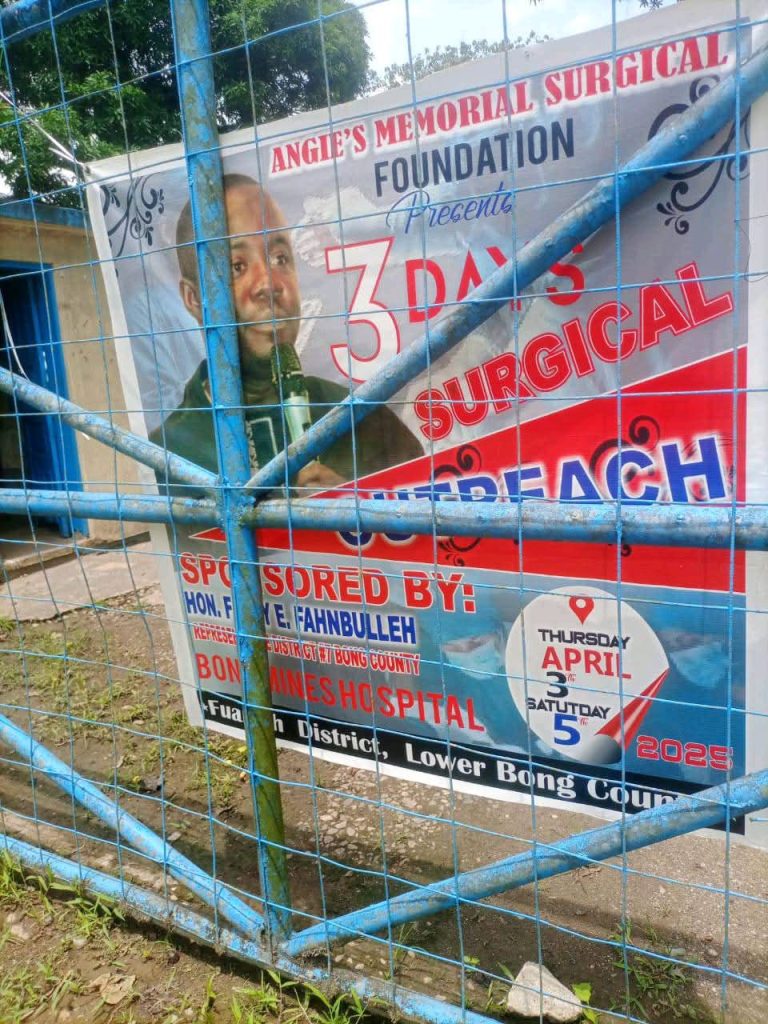The Bong Mining Company Hospital, a formerly trusted healthcare institution serving the residents of Bong Mines, District #7, and its surrounding areas, has become embroiled in a political controversy that threatens its functionality and the well-being of the community it serves. Allegations have surfaced against Representative Foday E. Fahnbulleh, accusing him of transforming the government-run hospital into a political outpost, thereby undermining its credibility and eroding public trust. This politicization of healthcare has sparked widespread concern and calls for immediate intervention to restore the hospital’s integrity and ensure continued access to quality medical services for the affected population.
The heart of the controversy lies in Rep. Fahnbulleh’s alleged interference in the hospital’s operations, blurring the lines between governance and personal political gain. The placement of his political banner at the hospital’s main entrance has been widely condemned as unprofessional and unethical, symbolizing the encroachment of political influence into a space dedicated to healthcare. Furthermore, the alleged appointment of a member of his Capitol Hill staff as the hospital’s new administrator has raised serious concerns about potential conflicts of interest and the prioritization of political agendas over the needs of the community. This perceived manipulation has reportedly led to a decline in public confidence, with some residents opting to seek medical care in neighboring Margibi County rather than utilize their local hospital.
The community’s apprehension stems from the understanding that political interference can severely compromise the hospital’s effectiveness and jeopardize the quality of care provided. Concerns have been raised about potential negative impacts on staff morale, service delivery, and resource allocation. The fear is that decisions regarding patient care, staffing, and budget allocation may be influenced by political considerations rather than medical necessity, potentially leading to a decline in the standard of care and hindering the hospital’s ability to effectively serve the community. The anonymous whistleblower’s complaint underscores the growing unease and emphasizes the need for swift action to address the situation before it further deteriorates.
Community leaders and residents have expressed their strong opposition to the politicization of the hospital and have vowed to resist any actions that compromise its integrity. They maintain that the hospital should remain under the direct supervision of the Ministry of Health and Social Welfare, safeguarding it from political manipulation and ensuring its operations are guided by professional medical expertise and the needs of the community. The ominous warning contained in the complaint, hinting at potential civic unrest if corrective action is not taken, highlights the depth of community concern and the potential for escalating tensions if the situation remains unaddressed.
The Ministry of Health’s silence on the matter adds to the growing anxiety and underscores the urgency of the situation. The lack of an official response leaves the community in limbo, uncertain about the future of their healthcare and fueling suspicions of inaction or complicity. The delay in addressing the issue also risks further escalating tensions and eroding public trust in both the hospital and the government’s commitment to ensuring access to quality healthcare. A swift and decisive response from the Ministry is crucial to restore confidence, address the community’s concerns, and prevent the hospital from becoming further entangled in political machinations.
The Bong Mines Hospital controversy serves as a stark reminder of the importance of maintaining the separation between politics and essential services like healthcare. The politicization of healthcare institutions can have devastating consequences, undermining public trust, compromising service delivery, and jeopardizing the well-being of vulnerable communities. It is imperative that healthcare facilities remain free from political interference, allowing medical professionals to make decisions based on clinical need and ensuring that resources are allocated equitably to serve the health needs of the population. A failure to address this issue effectively risks not only the future of the Bong Mines Hospital but also the health and well-being of the community it serves.














